
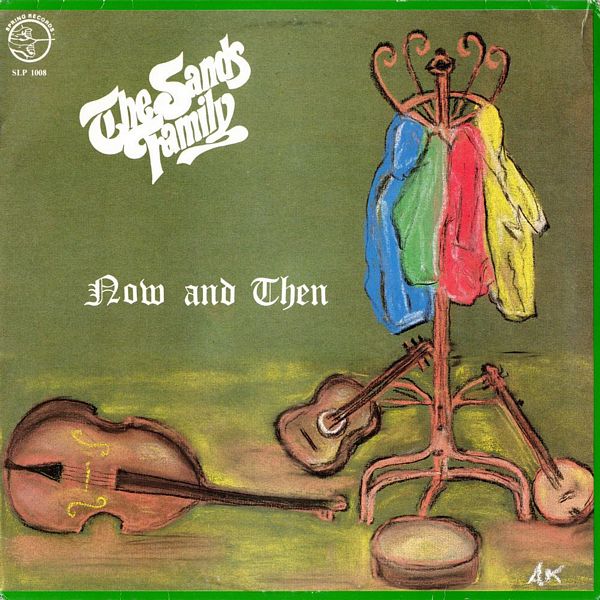 |
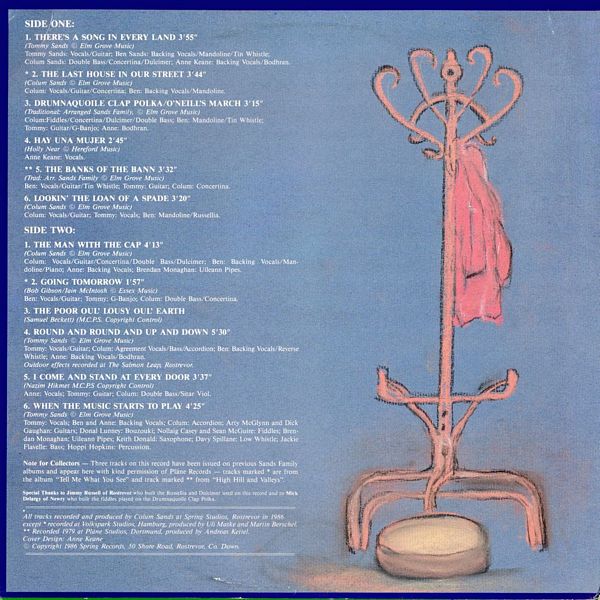
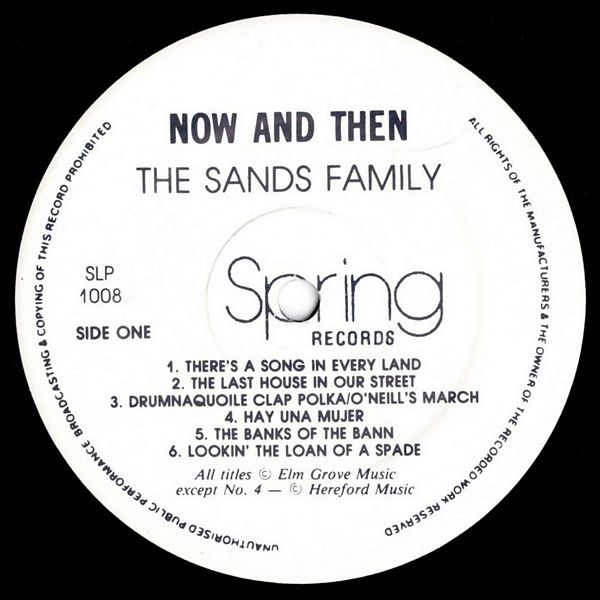
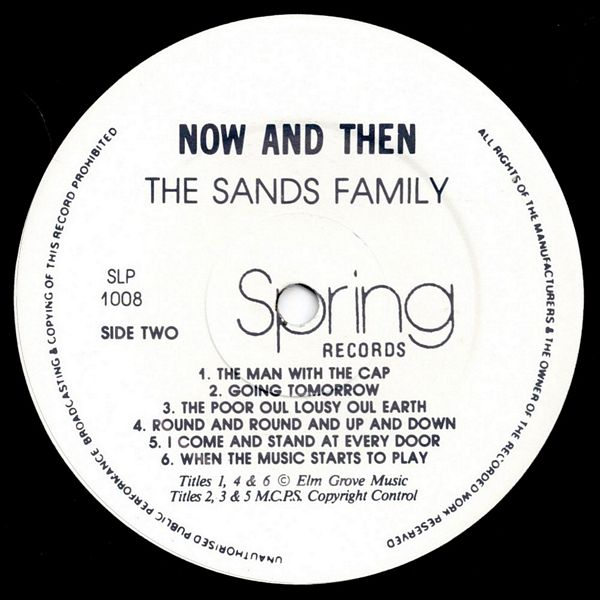 |
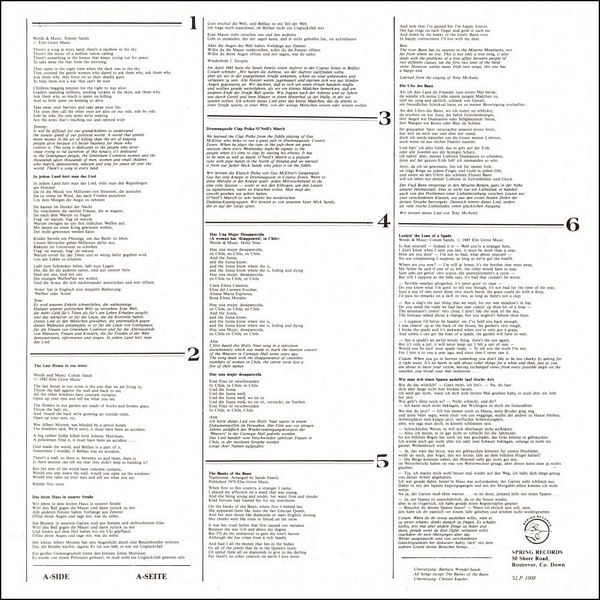
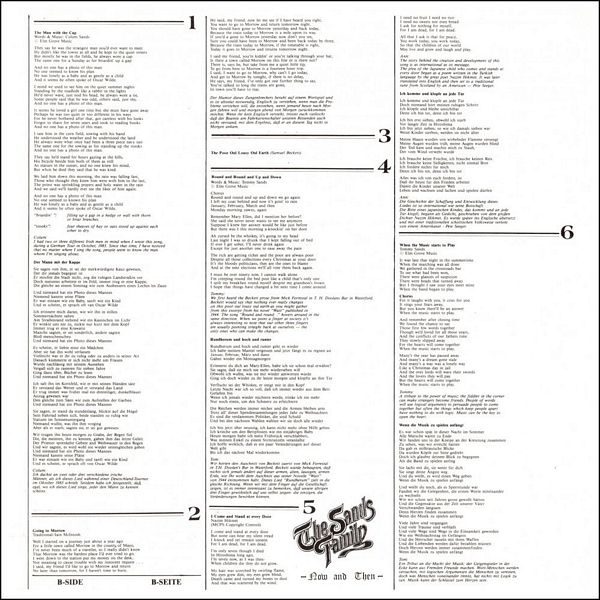 |
There's A Song in Every Land
Tommy: It will be difficult for our grandchildren to understand the lunatic greed of our political world. A world that spends more money in the art of killing than the art of keeping people alive because it's better business for those who control it. This song is dedicated to the people who never cease trying to rid ourselves of this lunacy; it's dedicated to the Greenpeace people, the Greenham Common women and the thousands upon thousands of men, women and small children who march, demonstrate, educate and sing for peace all over the world. There's a song in every land.
The Last House in our street
In April 1982, the Sands Family had a gig on Cyprus Street in Belfast. Colum writes: "We had the address where the performance should take place, but when we arrived at the specified street, it seemed totally uninhabited and abandoned. All the windows were bricked up and stared at one another like blind eyes. We thought it was a mistake, and we were about to continue driving when we noticed a little girl playing ball at the other end of the street. As asked for the address and she led us through scree and empty houses in a backyard to the hall in which we were to play. I wrote this song about the little girl who was playing alone in a street, in a world few people know or want to know about.
Drumnaquoile Clap Polka & O'Neill's March
We learned the Clap Polka from the fiddle playing of Gus McElroy who helps to run a great pub in Drumnaquoile, County Down. When he plays the tune in the pub — there are great sessions there every Wednesday night — he signals to the people when it's time to dap by waving his elbows. It has to be seen as well as heard. O'Neill's March is a popular tune with pipe bands in the North of Ireland and we learned it from our father Mick Sands who plays it on the fiddle.
Hay Una Mujer Desaparecida (A woman has 'disappeared', in Chile)
Anne: I first heard this Holly Near song in a television documentary which was made to mark the reunion concert of the Weavers in Carnegie Hall some years ago. The song deals with the disappearance of countless numbers of women in Chile, the centre verse lists a few of their names.
The Banks Of The Bann
Ben: The river Bann has its sources in the Mourne Mountains, not far from where we live. This is not only a love song, it also deals with the problems of a love affair between people of two different classes, see the first two lines of the third verse. However, unlike many Irish love songs, this one has a happy end.
Learned from the singing of Tony McAuley.
Lookin' the Loan of a Spade
Colum: When you go to borrow something, you don't like to be too cheeky by asking for it right away. It's no harm to talk about other things for a while and then, just as you are about to leave your victim, having exchanged views from every possible angle on the weather, you reveal your real intentions …
The Man with the Cap
Colum: I had two or three different Irish men in mind when I wrote this song, during a German Tour in October 1983. Since that time, I have noticed that no matter where I sing the song, people seem to know the man whom I'm singing about.
Going to Morrow
The tongue twister's humor is based on a pun and it is absolutely necessary to understand English if you want to understand the problems that arise when someone wants to drive to tomorrow today and return tomorrow morning. If you do not understand English, you might comfort yourself that the officer at the ticket counter did not understand our traveler either; with the result that he did not arrive in the morning on that day.
The Poor Oul Lousy Oul Earth & Round and Round and (Up and Down
Tommy: We first heard the Beckett prose from Mick Forrestal in T. H. Doolans Bar in Waterford. Beckett would say that nothing ever really changes on this poor oul lousy oul earth — as you might gather from this excerpt from his novel "Watt" published in 1944. The song "Round and round” hovers around in the same direction. When we point a finger at society it's always interesting to note that our other three fingers are usually pointing straight back at ourselves — the only ones who can make the changes.
I Come and Stand at every Door
Anne: The story behind the creation and development of this song is as international as its message. The plea of the Japanese child who comes and stands at every door began as a poem written in the Turkish language by the great poet Nazim Hikmet. It was later translated into English and then set to a traditional tune from Scotland by an American — Pete Seeger.
When the Music starts to Play
Tommy: A tribute to the power of music; the fiddler in the corner can make strangers become friends. People of words will use logical arguments to persuade people to come together but often the things which keep people apart have nothing to do with logic. Music can be the key to open the heart.